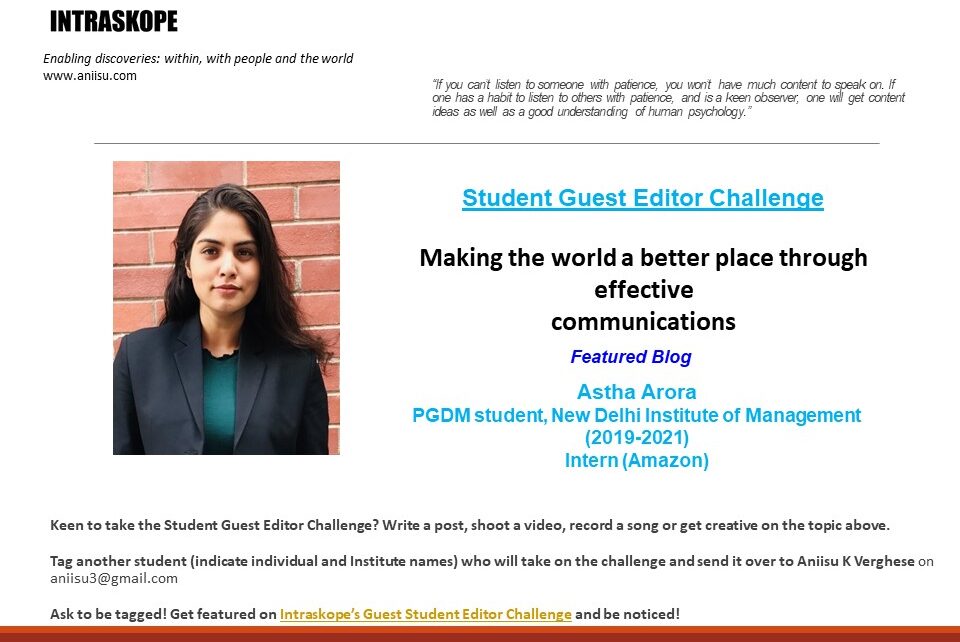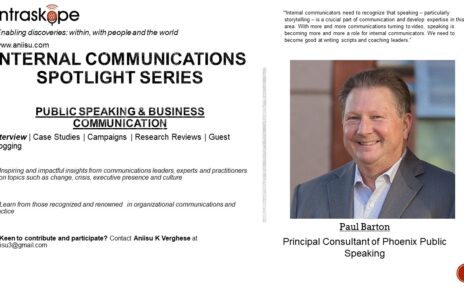Intraskope’s Student Guest Editor Challenge is an opportunity for students passionate about communications to showcase their creative spark and get noticed. Intraskope is India’s first and only blog on internal communications started in 2006. The theme for this series is: Making our World a Better Place Through Effective Communications.
In the first edition, Astha Arora discusses the importance of listening intently and how it can create a more empathetic world.
Astha Arora is pursuing a Post Graduate Diploma in Management in Marketing and Business Analytics from the New Delhi Institute of Management, New Delhi. A passionate and versatile marketing enthusiast and a keen learner, Astha has contributed to fundraising activities for not-for-profits. She is currently interning at Amazon.
She has tagged Mamta Jangid to take on the baton from her!
Read on.
Empathetic Listening Can Change the World
Good communication bridges the gap between confusion and clarity. There are roughly 6500 languages spoken in the world. Each language makes the world a diverse and beautiful place, with its rich repository of literature and stories. English, Mandarin, and Hindi are the most spoken languages. But do you think only languages can make one an effective communicator?
Let’s explore what effective communication is. In simple words, when the message is successfully delivered, received or understood by the listener or receiver, it is known as effective communication, while overcoming communication barriers. We may have read the 7 C’s of communication by Cutlip and Center (Completeness, Conciseness, Consideration, Concreteness, Courtesy, Clearness and Correctness). It helped me while creating e-mails, wring minutes of the meeting and or crafting short messages. Applying 7 C’s and my proficiency in the language has made me a good communicator, not an effective communicator. Now you might be wondering, why I said my proficiency in language and applying all the 7 C’s to be an effective communicator didn’t make a difference.
Effective communication always takes two to tango; both sender and receiver are equally responsible to make the communication impactful. It’s not always the sender, who makes a mistake while communicating, in most of the cases, the listener or receiver is at fault. The listener’s interpretation is influenced by a plethora of factors ranging from biases and prejudices, to mood and the relationship with the sender.
I still remember my management orientation session, where we played Chinese Whispers, and the intended message turned out be a distorted one. No wonder, Chinese Whispers is a new normal in our busy world. We try to be an effective and a flawless orator every time, but I doubt if a good speaker is always a good listener. Management trainees have always been taught to be an effective speaker, and in becoming one, most of them ignore the path of becoming a good listener.
One of my professors always taught me, “To be a good speaker, you have to be a good listener first”. If you can’t listen to someone with patience, you won’t have much content to speak on. If one has a habit to listen to others with patience, and is a keen observer, one will get content ideas as well as a good understanding of human psychology. One can take anecdotes from others’ stories and can use in one’s presentation or speeches. Effective communication is a result of effective speaking in addition to effective listening.
One of my favorite books by Dale Carnegie – How to Win Friends and Influence People, states some techniques to follow and make others like you. The most important factor is to be a good listener, and to talk to others’ in terms of their interests. This is done to connect with the audience and to make them feel important. Ultimately Dale Carnegie states that being genuinely interested in others, smiling and respecting people sincerely is a culmination of effective listening.
What’s your take? Please share your views, experiences and stories here.
Keen to participate in the Intraskope’s Student Guest Editor Challenge? Reach out to the student tagged and ask to get tagged! Or, reach out to [email protected] with your request.
Keen to participate in the ongoing series on Personal Branding, Internal Communications or CSR Communications? Drop me a note at [email protected]



